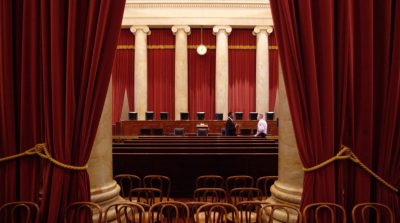Due Process and the Courts
What does the constitution say about due process?
The Fifth Amendment to the Constitution says clearly that no person shall be deprived of life, liberty, or property without the due process of law. Note that this says person, not citizen, and over the years the Supreme Court has consistently ruled that the Due Process Clause applies to all people in the United States.Do non-citizens have the right to due process in the U.S.?
Yes. The Constitution guarantees due process rights to all "persons," not just citizens. This means non-citizens, including undocumented immigrants, are entitled to fair treatment under the law. This includes the right to defend themselves in court. But recent Trump administration policies that speed up deportations and limit access to legal representation make it harder for non-citizens to get their fair day in court.- Access to legal representation Access to legal counsel is an essential part of our justice system and our democracy. In the criminal justice system, anyone facing even one day in jail gets a lawyer if they can't afford one. But immigrants facing deportation usually don't get that chance.The research is clear – the most effective way to ensure some level of due process for people navigating our complicated immigration system is for them to have trained attorney at their side. But Trump administration is now working to strip attorneys from as many people as possible, all in the name of increasing its deportation numbers. This attempt to eliminate basic due process will hurt people who already have few options.
- Fair day in court Due process guarantees that individuals have the opportunity to defend themselves in court. This includes non-citizens facing deportation.
Why is due process important?
We are seeing right now the importance of due process when it comes to President Trump's actions to carry out the so-called Alien Enemies Act, a 1798 wartime law that permits people to be deported outside of the normal framework of immigration law. President Trump has alleged that this law allows him to simply point at any person, declare them to be an alien enemy, and kick them out of the country without ever having a chance to see a judge. Thankfully, the Supreme Court said that is not true, and in a unanimous decision, ruled that people can challenge the Trump administration's invocation of the Alien Enemies Act. That is why due process is so important, because it means that no person can be rounded up and sent to another country without a chance to go to court and make the government prove their case.How is the American Immigration Council working to protect due process?
- We serve thousands of individuals in immigration detention centers through the Immigration Justice Campaign, our initiative with the American Immigration Lawyers Association. The Justice Campaign provides free legal services for immigrants who would otherwise have to navigate our complicated immigration system without a lawyer.
- We use the courts to demand a fair process for immigrants. Our litigation team is fighting back against the Trump administration’s blatant disregard for due process including filing a lawsuit challenging their illegal detention of immigrants in El Salvador’s notorious Terrorism Confinement Center (CECOT).

Immigration Groups Seek Information on Customs and Border Protection’s “Translation” Activities in Northern Border States
Last week an alliance of immigration advocacy groups represented by the Legal Action Center filed Freedom of Information Act (FOIA) requests with U.S. Customs and Border Protection (CBP). Read More

Administration Seeks to Protect DACA Recipients from Judge Hanen’s Unusual Order in Immigration Case
This week, the Obama administration filed a stay motion, a request to halt Judge Hanen’s highly extraordinary order in May telling the Department of Justice (DOJ) to turn over personal information of about 50,000 or so individuals who have received three-year reprieves from deportation and three-year work permits… Read More

Latest Flores Filing Highlights Stories of Children and Mothers Unlawfully Detained by Obama Administration
This week, the Center for Human Rights and Constitutional Law (CHRCL) asked a federal judge to order the government to comply with the Flores settlement and appoint an independent monitor to oversee the Obama Administration’s ongoing family detention policy. Read More

Despite Obstacles, A Majority of Child Migrants Appear in Immigration Court
Reuters reported last week that the Obama Administration would begin to round up Central American women and children, including “minors who have entered the country without a guardian and since turned 18 years of age” and begin deporting them. The news report goes on to say that “many of… Read More

Children in Immigration Court: Over 95 Percent Represented by an Attorney Appear in Court
Over the past few years, thousands of children—many fleeing horrific levels of violence in Central America—have arrived at the U.S. border in need of protection. Most children are placed in deportation proceedings before an immigration judge, where they will carry the legal burden of proving that they should be allowed… Read More

Texas’ Distorted View of the Legal Basis for DAPA and Expanded DACA
On April 18, the U.S. Supreme Court heard oral arguments in United States v. Texas, a case brought by 26 states to challenge President Obama’s deferred action initiatives, known as expanded Deferred Action for Childhood Arrivals (expanded DACA) and Deferred Action for Parents of Americans and Lawful Permanent… Read More

Immigration Court Backlog Shows No Sign of Shrinking
The latest figures show that the number of cases pending in immigration court continue to grow. According to the Transactional Records Access Clearinghouse (TRAC), there were 486,206 cases in the backlog as of the end of March. This is almost 30,000 more pending cases than Executive Office of Immigration… Read More

What Are the Next Steps at the Supreme Court in U.S. v. Texas?
The oral arguments in U.S. v. Texas are now complete and dozens of news articles and analyses have attempted to predict what the Court will decide. However, all that truly matters is the final decision rendered by the eight sitting Justices. This begs the questions of when and… Read More

Understanding Justice Kennedy’s “Upside Down” Argument in U.S. v. Texas
On April 18, the United States Supreme Court heard oral arguments in United States v. Texas, a case brought by 26 states to challenge President Obama’s frozen deferred action programs, known as Deferred Action for Childhood Arrivals Plus (expanded DACA) and Deferred Action for Parents of Americans and… Read More

Digesting the Argument in U.S. v. Texas: What Is Lawful Presence and Why Does It Not Mean What It Sounds Like?
The oral argument in United States v. Texas shined a light on the confusion between the term “lawful presence” and what it means to have a legal immigration status in the United States. Early in the argument, Chief Justice Roberts noted that in its brief, the United States asserted… Read More
Make a contribution
Make a direct impact on the lives of immigrants.
